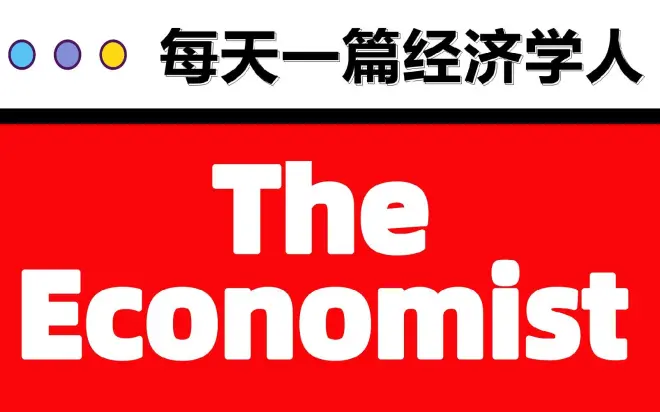每天一篇经济学人 | Digital advertising 数字广告(2...

For digital-ad sellers, 2021 was always going to be a hard act to follow. As work, play and shopping shifted online during the covid-19 pandemic, internet advertising boomed. In America spending rose by 38%, to $211bn, compared with average annual growth of 21% in the preceding five years, according to eMarketer, a research firm. Smaller social-media firms such as Pinterest and Snap at times hit triple-digit year-on-year quarterly revenue growth. Even giants such as Alphabet (Google’s parent company) and Meta (Facebook’s and Instagram’s), which receive a third and a fifth of the world’s digital-ad dollars, respectively, clocked rates of 50%.
【1】clock 达到
对于数字广告销售商来说,2021年永远是一个望尘莫及的一年。在新冠期间,随着工作、娱乐和购物转移到网上,互联网广告蓬勃发展。根据研究公司eMarketer的数据,美国的消费增长了38%,达到2110亿美元,而在之前的五年里,美国的消费年均增长为21%。Pinterest和Snap等规模较小的社交媒体公司的季度收入同比增长有时会达到三位数。即使是Alphabet(谷歌的母公司)和Meta (Facebook和Instagram的母公司)这样的巨头,它们分别获得了全球数字广告收入的三分之一和五分之一,其广告收入也达到了50%。
The contrast with 2022 is stark. On July 21st Snap reported that its sales grew by 13%, year on year, in the second quarter, its most anaemic ever. In a letter to investors, the firm confessed that so far this quarter revenue was “Approximately flat”. The market was spooked, and the company’s share price fell by almost 40%. The next day Twitter, which also depends on advertising, reported that its revenue had fallen slightly in the three months to June, compared with last year.
这与2022年形成了鲜明的对比。7月21日,Snap发布报告称其第二季度的销售额同比增长了13%,是其有史以来最疲软的一次。该公司在致投资者的一封信中承认,本季度到目前为止,收入“大致持平”。市场受到了惊吓,该公司的股价下跌了近40%。第二天,同样依赖广告业务的Twitter报告称,与去年相比,其截至6月的三个月的收入略有下降。
That triggered concern about the health of online advertising, dragging down the share prices of the industry’s titans. On July 26th Alphabet duly disclosed Snap-like quarterly sales growth of 13%, down from 62% in the same period last year. That was less terrible than expected (its market value rose by 8% on the news) but still pretty bad (it remains a bit below what it had been before the Snap bombshell). A day later Meta said that its revenue declined for the first time, by 1% year on year.
这引发了人们对在线广告状况的担忧,这拖累了该行业巨头的股价。7月26日,Alphabet正式公布了与snap类似的季度销售额增长13%,低于去年同期的62%。这并没有预期的那么糟糕(消息传出后,其市值上涨了8%),但仍然相当糟糕(仍略低于Snap爆炸新闻前的水平)。一天后,Meta表示其收入首次下降,同比下降1%。
Upstart challengers like Snap are the most exposed. When marketing budgets get trimmed, advertisers tend to stick to what they know, says Mark Shmulik of Bernstein, a broker. And they know Google search much better than they do Snap’s experiments with augmented reality. The big firms also boast larger and more diverse sets of customers; Meta serves 10m advertisers globally, compared with Snap’s estimated 1m or less. That insulates them somewhat from softening demand.
Snap这样的新贵挑战者更容易收到攻击。伯恩斯坦的经纪人马克•什穆里克说,当营销预算被削减时,广告商倾向于继续使用他们所了解的产品。他们对谷歌搜索的了解比Snap的增强现实实验要更多。大公司还拥有更大、更多样化的客户群体;Meta在全球为1000万广告商服务,而Snap估计为100万甚至更少。这在一定程度上使它们可以在一定程度上免受需求疲软的影响。
Somewhat, but not fully. Last year’s covid-boosted baseline is not the only thing weighing on the digital-ad market. Ad-sellers are feeling the delayed effect of Apple’s change last year to the privacy settings on iPhones, which stops advertisers from tracking people’s behaviour on its devices, and thus from measuring the effectiveness of digital ads. Snap cited the Apple policy as a reason for recent weak results. Meta estimates that the change will shave $10bn, or 8%, from its revenue this year.
只是一定程度上,并不是全部。去年受新冠影响的基线并不是拖累数字广告市场的唯一因素。去年,苹果改变了iPhone上的隐私设置,让广告客户无法追踪用户在其设备上的行为,从而无法衡量数字广告的有效性。广告销售商感受到了这一改变的延迟效应。Snap将苹果的这一政策列为近期业绩疲弱的原因之一。Meta估计,这一变化将使其今年的收入减少100亿美元,即降幅为8%。
Both Alphabet and Meta are also facing fiercer competition. TikTok, a Chinese-owned short-video platform beloved of Western teenagers, is taking eyeballs from American social media, and ad revenue with them. Perhaps more concerning, previously ad-incurious tech titans are also getting in on the action. In the past couple of years Amazon has built the world’s fourth-biggest online-ad business. Apple has a small but growing ad operation. And Microsoft has just been named as Netflix’s partner in the video-streaming giant’s new ad-supported offering.
Alphabet和Meta也面临着更加激烈的竞争。TikTok是一家深受西方青少年喜爱的中国短视频平台,它正在从美国社交媒体平台上“吸引”大家的眼球,并从中获得广告收入。或许更令人担忧的是,以前对广告不感兴趣的科技巨头们也开始参与进来。在过去的几年里,亚马逊建立了世界第四大在线广告业务。苹果的广告业务规模虽小,但在不断增长。微软刚刚被任命为Netflix的合作伙伴,并为这家视频流媒体巨头提供新的广告支持服务。
Another reason for the big ad-sellers’ slowdown is similarly structural. For years they shrugged off blips in the broader economy, as many customers came to see online ads as a virtual shopfront that needed to be maintained even in tough times—often at the expense of other ad spending. That has left ever fewer non-digital ad dollars available to be diverted online. In a pinch, advertisers may now therefore need to take an axe to their digital billboards.
大型广告销售商增长放缓的另一个原因是类似的结构性原因。多年来,他们对整体经济的波动不以为然,因为许多客户开始将在线广告视为即使在困难时期也需要维持的虚拟店面,通常是以牺牲其他广告支出为代价的。这使得原本就很少的非数字广告支出转向了在线广告。因此,在紧要关头,广告商现在可能需要砍掉他们的数字广告牌。
The pain isn’t felt equally. Google, whose search ads rely less on the sort of tracking Apple has curbed, may have benefited from Meta’s misery, helping offset some of the slowdown. On July 27th Spotify bucked the trend among challenger platforms, reporting unexpectedly healthy ad revenues from its music-streaming service, which helped buoy its share price by 12%. Even so, the business cycle may be catching up with big tech.
痛苦并不相通。谷歌的搜索广告较少依赖于苹果所限制的追踪,它可能从Meta的不幸中受益,从而帮助抵消了部分放缓。7月27日,Spotify在挑战者平台中逆势而上,报告了其音乐流媒体服务的广告收入出人意料地“健康”状况,这帮助其股价上涨了12%。即便如此,商业周期可能会困扰大型科技公司。

